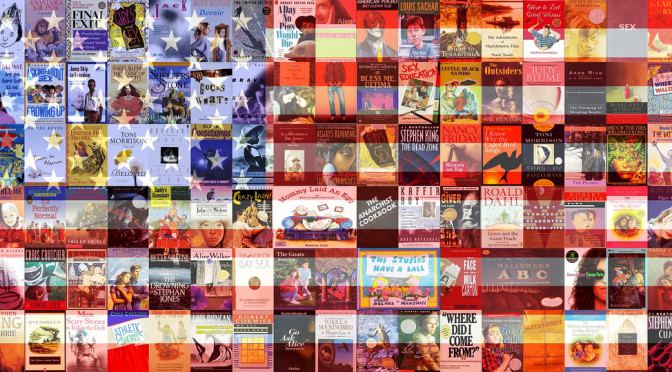Banned Books Week offers avid readers like ourselves the chance to rejoice in the literature that has been banned nationally over the years. For many, it’s a kind of twisted Dionysian festival where what’s condemned by society is praised by culture — without the massive alcohol consumption, of course. Unless that’s what you’re in to. Fitzgerald would approve, I’m sure.
Starting on Monday 09/28 and continuing through Friday 10/2, the Outreach Team took an active part in the aggressive reading of banned books and educating the DePaul community about what it means to be a banned book. We partnered with the library in making banned books available to students and offering the the chance to read from banned books in what we call Readouts.
Readouts are usually held in public places on campus — like the Lincoln Park Student Center or the DePaul Center in the Loop. The library brings a collection of popular banned books, and some perhaps not so popular, that students can read out loud. This act is in direct violation of the mindsets that cause some of these books to be challenged so often and under such suspect circumstances.
The Readouts were held on Monday 09/28 and Tuesday 09/29, and they were incredibly successful. Many students stopped by to learn more about the history of banned books and even check some of them out of the library for themselves.
To wrap up Banned Books Week at DePaul, the Richardson Library hosted a well attended CityLit theatre troupe performance of scenes from the top 10 challenged books of the year. Top ten not in the sense that they are the best written, necessarily. More the top ten as in they are the most often banned. Being able to see the words of these fantastic books performed live just made the already festive mood of the week even better. The weight of the author’s words — and some of the reasons why they might have been challenged — became more prominent to the audience.
Some of the best experiences from this week were educating students about banned books. Many books that we all love and admire have been challenged across the country. Telling students and faculty about the history of their favorite novels is a wonderful way to honor Banned Books Week and the authors who continue to risk their reputation and readability by publishing works that dare to be provocative.
Discover more from UCWbLing
Subscribe to get the latest posts sent to your email.

